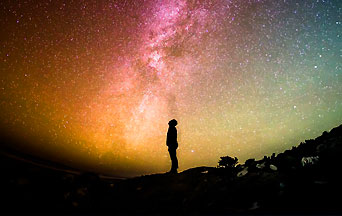
The Church has had some difficulty interpreting the pandemic crisis from a theological viewpoint. This is because contemporary theology has replaced the traditional conception of God’s Creation, according to which He created everything out of nothing and produced a whole collection of things mysteriously ordered for salvation.
Contemporary theology no longer accepts this vision of Creation but rigorously follows the teachings of Jesuit Father Teilhard de Chardin. Creation no longer comes from God. Instead, God comes from the evolution of the cosmos. This approach makes it impossible to analyze a pandemic having in mind God the Creator.
A microorganism like Covid-19 can do surprising things. It can even call into question the Christian vision of Creation. It can also allow us to contrast the two theological conceptions of Creation: the longstanding traditional one, and the “cutting-edge” contemporary theology.
10 Razones Por las Cuales el “Matrimonio” Homosexual es Dañino y tiene que Ser Desaprobado
Many have noted that the Church has had some difficulty interpreting the current pandemic from a theological viewpoint, i.e., from the standpoint of the history of salvation and the perspective of the salvation of souls. There is no lack of prayers to Heaven or devout requests for Mary’s intercession. However, these requests are for help in the current trial rather than an opportunity for amendment, whether individually and collectively. In other words, people considered the epidemic mainly as a natural fact, asking Heaven for help in dealing with this natural suffering.
The traditional conception of Creation roughly follows this outline: God created everything out of nothing, so He is the First Cause and Last End. Consequently, He desires and permits everything for a greater good. The eternal salvation of souls is the ultimate greater good, and so He mysteriously ordered everything to that end. Therefore, no event is only natural, precisely because nature is not something autonomous from God. Natural phenomena also involve salvation directly or indirectly.
Events are also related to the sins of men. Thus, both Original Sin and present sins have an impact on events. That is to say, sins against God impact events, not the sins against the natural world (ecological sins). That is why the Church has not only the right but also the duty to reflect upon this issue and link natural catastrophes to God’s providential plan for our salvation. We can and must interpret such events as invitations to conversion and spiritual purification.
 Learn All About the Prophecies of Our Lady of Good Success About Our Times
Learn All About the Prophecies of Our Lady of Good Success About Our Times
Contemporary theology, however, no longer accepts this vision of Creation. Following the lead of Teilhard de Chardin, it posits that everything is explained as a movement of evolution from the imperfect to the most perfect, and Christ is the final Omega Point of that evolution. This notion contradicts Saint Thomas, who affirmed that the world was not eternal precisely because it was created from nothing, even if, according to him, its beginning was not demonstrable.
Instead, up-to-date theologians see the world as a process always tending towards the greater. Christ is the apex of this process. One could dare say that Creation no longer derives from God, but God comes from the evolution of the cosmos. This vision contradicts a fundamental principle of Christian metaphysics that affirms the greater cannot come from the lesser.
In the new vision, however, the greater can come from the lesser because matter can produce form. Matter, as many claim (for example, Ernst Bloch), is not only matter but has an internal dynamism that allows it to generate forms. According to Teilhard, this can be seen in man, in whom matter produces spirit in the famous process of “man-ification.” Man is a product of evolution. He was not created directly by God through His Breath of Life but indirectly within the process of creation-evolution. Even the soul can have this origin, although Pius XII in the Encyclical Humani Generis confirmed the opposite doctrine.
Eternal and Natural Law: The Foundation of Morals and Law
According to Karl Rahner, Creation also follows this path. He claims that thinking of a God who creates from nothing in a metaphysical sense means interpreting God according to the categories we employ to explain the things of this world, such as an artisan who creates his work. In Rahner’s words, such concepts think of God in a categorical rather than transcendent sense.
Thus, Rahner’s God works only through secondary causes and not through direct intervention. He creates from within nature and history through evolution. We have a sense of dependence on God not because He created us, but because through evolution, we matured and developed a sense of dependence on God. All theological categories, including Creation, mature historically and through evolution. Not even Jesus Christ knew that He was God but evolved in that belief progressively.
This approach makes it impossible to relate a pandemic to God the Creator, if only for having allowed it. Accordingly, the pandemic can only have a natural meaning and conveys no supernatural message. To claim the contrary is once again to impose our earthly-bound mental categories upon the divine plane.
Science Confirms: Angels Took the House of Our Lady of Nazareth to Loreto
The only reading of the pandemic that contemporary theology allows is a natural commitment to face a natural event. We can only see it as God manifesting Himself in nature and history through evolution. Modern man would reject a transcendent vision “from God’s point of view,” related to the salvation of souls, as unreal and incomprehensible as “magic.”

